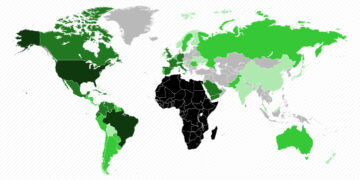In the vibrant tapestry of the United States, woven with dreams and aspirations, you’ll find stories of African immigrants who embarked on a journey of hope, leaving behind their beloved homelands, most of them, for the chance to build brighter tomorrows for themselves and their families.
In this feature of Diasporan Perspective, we ask some members of the African Diaspora to share their reasons for leaving their native shores, if there is a possibility of returning home, and under what conditions will they take that step. Their responses also reveal an unwavering connection to one’s heritage that echoes in every heart.
Kayode Adekunle

Kayode Adekunle is a security practitioner with concentration on Cyber Security and OSINT. He utilizes skills and training to help clients analyze and strengthen digital security measures, identify vulnerabilities, and gather intelligence from open sources to protect organizations from online threats.
Kayode has lived abroad since 1976. His family moved to England in the mid-seventies and he left for his post-secondary education in the U.S in 1982.
Primary reason for leaving Nigeria?
Choosing to leave for England for studies was driven by the exceptional standard of education offered. The United Kingdom is renowned for its world-class secondary schools and universities, cutting-edge research facilities, and diverse academic programs that foster intellectual growth and personal development.
Moreover, the UK’s commitment to innovation, interdisciplinary learning, and critical thinking cultivates a global mindset and prepares individuals to thrive in an increasingly interconnected world.
Did you have initial intentions to return? If yes, what changed?
Yes, the plan was to return after university education in the U.S. The decision not to return home was due to political, economic, and general insecurity. Firstly, the volatile political landscape poses a significant risk to personal safety and the ability to freely engage in activities aimed at societal improvement.
Additionally, economic instability and limited opportunities hinder the potential for sustainable progress in key sectors such as education and governance. Moreover, the prevailing atmosphere at the time of insecurity, generates uncertainty, making it challenging to establish and maintain or effect substantial change.
While the desire to contribute to the development of my home country remains, prioritizing personal safety and the potential for greater impact in more stable environments becomes paramount in this decision-making process.
Any thoughts about coming back to Nigeria?
Yes. Returning to my home country when safety and political stability are entrenched becomes a compelling and fulfilling prospect. The assurance of a secure environment creates a conducive atmosphere for personal growth, professional endeavors, and societal progress.
The presence of political stability should foster a sense of hope, unity, and collective responsibility, inspiring diasporas like myself to contribute to the country’s development in various sectors, including technology, economy, governance, and infrastructure.
What do you hope to achieve if/when you return?
Returning to my native country to help set up NGOs and improve education, infrastructure development, and governance are the areas of greatest need and a compelling endeavor for several reasons.
Firstly, by leveraging my familiarity with the local culture, language, and challenges, I can effectively navigate the socio-political landscape and implement targeted solutions.
Secondly, my international exposure and expertise in areas such as information security, education, infrastructure, and governance would allow me to bring innovative and proven strategies to address pressing issues. Moreover, investing in these sectors will create a sustainable impact, empowering communities, reducing poverty, and fostering self-reliance.
Ultimately, through this commitment, I aim to contribute to the holistic development of my country and uplift the lives of its people.
Mfon E. Ufot

Mfon Ufot is a community counselor. She has been living in the United States for over 35 years.
Primary reason for leaving Nigeria?
To join my husband in the United States.
Did you have any intentions to return?
We thought about it initially, but having children changed that for us.
Do you still harbor any thoughts of returning to Nigeria?
Not anymore.
Why not?
I believe that you have to make a difference wherever God has placed you, whether in your country of birth or in the United States.
Taye Doherty

Taye Doherty works in financial services. He’s lived abroad for 43 years, but still visits his native homeland, Nigeria, at least once a year. His reason for leaving Nigeria all those years ago was to pursue his education
Did you have initial intentions to return? If yes, what changed?
Yes, I thought I would only stay here for a maximum of five to seven years, enough for me to get my Master’s degree. But life happens…I got married and had kids.
Do you still harbor thoughts about coming back home, and why?
Yes, all the time. There was a time I was being recruited by a consulting firm to work in Nigeria, and I was going to do it, but they would not pay me as an expatriate and backed out.
The goal is to retire in Nigeria and I’m already putting plans in place.
Nigeria is my home, and no matter how accomplished I feel, I will not get the same respect here as I would get in my native country.
Olamilekan Banks Akindunni

Olamilekan “Banks” Akindunni is a serial entrepreneur and motivational speaker. He left Nigeria in August 2004.
What was your primary reason for leaving Nigeria?
I had just finished university and felt there were better prospects for me outside of the country. I had my brothers and a couple of friends abroad, and I knew they were doing well, so I decided to leave. I went to the UK to do a Master’s degree in Investment and Quantitative Finance, though initially, I had wanted to do my ACCA, but I had to take care of myself, school fees and every other thing.
I needed to make money, and I started doing a security job. I worked the job at night, while school was during the day. I realized I was sleeping in class and was really struggling, and at the end of the day, I had to make a choice. I ended up not completing the ACCA.
Did you have initial intentions to return? If yes, what changed?
I did, because I came to Nigeria a couple of years later, and saw all my friends progressing and doing well in corporate Nigeria. I didn’t stay back because I had nothing but my first degree.
I thought of going back to the UK to work, then saving some money, and then doing a Master’s degree in a top business school and coming back to Nigeria to work. So, I did a Master’s in Investment and finance and unfortunately that was when the financial market crashed, and my portfolio didn’t do well. I realized the only thing that survived was commodities. So I started doing a lot of research about Nigeria and discovered it was the most blessed country in the world with natural, mineral and human resources.
In 2009, I decided to move back home. Armed with a foreign degree, I thought I would be able to get a job easily, but I couldn’t. Turns out my foreign degree was intimidating to a lot of people, and that was how I ended up not working in corporate Nigeria. I explored exporting commodities like cashew, ginger and gemstones. Of course, doing business is really tough in Nigeria.
At the end of the day, I applied to do an MBA and also got a part scholarship to study in an international business school in Boston. That was how I wound up in the USA.
Do you still harbor thoughts about coming back home, and what would the criteria be?
Yes. So it’s two things. Security and infrastructure need to be in place. The environment must allow me to thrive, because I have over the years, built a very strong network globally. I go to different countries and they want to work with us in Nigeria, but the environment, government and people are very hostile. If you are not greasing hands, and doing other things it’s very bad. We have to allow things to be done properly. We have to enrich not just our pockets, but develop the communities especially.
Peter Dele Ashaolu

Peter Dele Ashaolu is an engineering technical leader. He has lived abroad for 47 years. His primary reason for leaving Nigeria at the time, was to get a higher education.
Did you have initial intentions to return? If yes, what changed?
Yes, I planned to return after my higher education, but I was offered a good job in high-tech.
Do you still harbor thoughts about coming back home, and why?
Of course, yes! To live and work where they know me by my first name.
What would be the criteria for your return?
A country where human life and rights are taken seriously with opportunity for employment.
Ayọ̀túndé Fáṣọlá

Ayọ̀túndé Fáṣọlá is a brand and content strategist, who has spent 44 years in the U.S.
What was your primary reason for leaving at the time?
My mother brought me to the U.S. when I was a baby. I returned to Nigeria when I was five and came back to America when I was eight.
After you got older, has the thought of returning to Nigeria crossed your mind?
It has, several times. The older I get, the more rooted I feel in my personal identity as a Yoruba woman. And unfortunately, due to religious Christian beliefs (which are more dominant in America), most people judge Africans as poor and backwards, unless of course, you conform, change your name and dress like them.
I did try to return—13 years ago. The infrastructure was hard on my body. The crowd, congestion, traffic, etc wasn’t anything I could get used to, but I tried for 6 months.
Why would you want to return?
You can not feel like a second class citizen in your own home.
What would be the criteria for you to make a move back?
An improvement in infrastructure and law enforcement, and a respect for the female gender—not only the female gender, but feminine energy as a whole, which most religions don’t respect.
One has to be able to move freely and unencumbered to achieve their life’s purpose.
As the popular phrase, “East or West, home is best,” suggests, do you hope to return home some day? Let’s know your reasons for your answers. And if you intend to, what do you hope to achieve when you return?
































